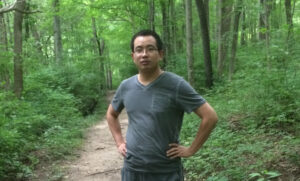Mechanical engineering Ph.D. student, Bang He, was recently recognized with the University of Utah 2018 Individual Dedication Research Award, by the Student Leadership and Involvement Center in the Office of the Dean of Students. Research requires dedication, long hours, and a long term commitment. This award recognizes academic contribution made by an individual or group through research in their field in the past year. Bang He is advised by mechanical engineering assistant professor Pania Newell and is a member of the Integrated Multi-Physics Laboratory.
“I was sure that Bang He was the student I wanted in my lab,” said Newell. “He is simply a student with great passion for learning, a student whose ambition is to become the best in his field, one who does not take things in life for granted, and a student who cares about the bigger picture including equally supporting his wife’s education.”
He’s research project is to investigate the flow-driven fracture in porous media, particularly the two-phase flow problems. Through this research, he would like to answer some fundamental questions on flow-driven fracture problems in porous media. Specific questions include how do the fractures propagate along the injection of two-phase flow into porous media, and how do the new fractures redistribute the flow?
The fracture of porous media is usually a critical concern in fluid-saturated porous media systems used in many engineering and science subjects like geophysics, chemistry, biomedical, hydrology, nuclear engineering, fuel cell, petroleum engineering, and more. For example, fractures of shale rocks will create new flow paths for production of crude oil, while the fracture of nuclear reactor may lead to the leakage of nuclear radiation. Therefore, the advance of porous media fracture study is crucial for energy production, structure security and human health.

Bang He explains, “Due to the complex solid-fluid coupling physics, our knowledge on porous media fracture is not sufficient to allow us to fully control the fracture behavior in fluid-saturated porous media. My research goal is to improve our scientific understanding of flow-driven fracture in porous media by developing a novel and robust theoretical and numerical framework, and a new experimental approach to investigate the solid-fluid interaction in porous media.”
“By reaching this objective, we can improve our prediction and control of the porous media fracture in presence of fluid flow. As a result, we can enhance the secure design of nuclear reactors or fuel cell systems, prevent the bone fracture, expand fossil energy production, enhance the strength of chemical devices, etc.”
To learn more about Bang He and his research visit the Integrated Multi-Physics Laboratory.